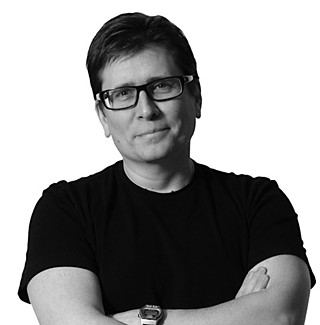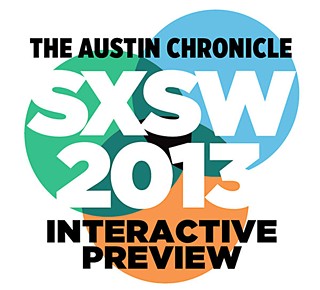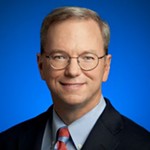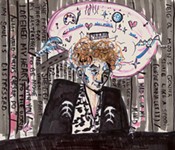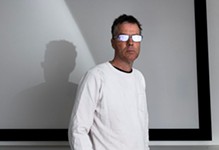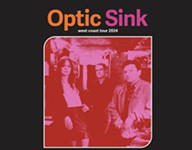Take Two Aspirin and Ping Me in the Morning
Health care: an oral future
By Shawn Badgley, Fri., March 8, 2013
Translating a message that might save mankind, John Nosta sounds like one of Asimov's Eternals on a collect call from upwhen: fervent and in a hurry. Leslie Ziegler speaks with the same enthusiastic tones about her "gut bacteria" self-testing kit via uBiome as she does an upcoming trip to India. Bryan Sivak apologizes for running a few minutes late between dropping his child off at a play date on President's Day and readying a crucial block of President Obama's Affordable Care Act.
These three and other innovators and presenters at SXSW Interactive 2013 took time out of their dizzying schedules during the past month to talk with the Chronicle about health care, a predominant concern of this year's conference. From a series of conversations and emails, I've recontextualized their quotes, with the aim of creating a sort of all-star super-panel, a broader discussion based on each participant's area of expertise, while at the same time covering as much programming ground as possible.
John Nosta, Ogilvy CommonHealth, Forbes.com, TEDMED: Where do you want to start? Do you want to start with the emergence of digital health? I think that the world is changing in ways that are unpredictable. And I would reference the development and the evolution of the smartphone, just over a few short years. The technology is expanding at such a rapid rate, that we are finding uses that we never even thought of. Now, play into that this sort of subconscious driver, or the science-fiction realty of health, that has so impacted inventors and developers throughout the years, going back to Star Trek and the Tricorder and all of these different devices that can scan your body. They're actually coming to fruition now. Not only is science fiction coming to life, but it's shaking the cornerstones of practice.
One testament to this is the Tricorder Qualcomm Prize. And this is a $10 million prize that is fostering the development of scanners that very simply scan your body and decipher indices that can be the arbiter of illness or health. So, what's happening now is that the rapid movement of technology is making its way into the clinical practice of medicine, but it's also making its way into the practice of wellness on the part of the consumer. And this leads to this issue of the quantified self.
Christie Hefner, Canyon Ranch Enterprises: I think that some of the early, very valuable uses of the Internet for consumer empowerment regarding health were the innovations that WebMD and others have followed around the availability of massive amounts of information regarding conditions and symptoms and research and programs. For the first time, now going back a number of years, instead of the consumer not having resources beyond a second opinion, you could talk to other people who had the same diagnosis, you could find out what pilot programs were going on in Europe, you could talk to a community of people who had loved ones facing this condition. I think that has been enormously helpful.
But where I think things are going is to allow people to move beyond just thinking about conditions and symptoms to thinking about what they can do proactively with regard to nutrition, stress, sleep, exercise, and brain health, that will allow them to feel their best, not just to intercede after they get a diagnosis.
Brad Davidson, Ogilvy CommonHealth Behavioral Insights: The Internet can help you make good decisions by directing you to people who have been in your shoes, and who have made those choices. You can see how it worked out for them, and witness some real-world possible outcomes. I think the Internet is probably the only thing that's going to help people make their own decisions in an informed way, but you gotta find the right information.
From an anthropological standpoint, what we've lost in all of this, and what you see these online health care communities of practice giving people, is the relationship aspect of doctoring. We've turned doctoring into a very transactional event. So, yes, in the sense that, we could turn our current primary care physician into the Bones McCoy Tricorder, because we don't really talk to our doctors now, anyway. But if you go back to what doctors used to be, they were something a little holier, and we're missing that now.
We're still people, and we still need that, so we're just going to get it somewhere else. The more that we turn the practice of medicine into a transactional, algorithm-based, automated, do-it-yourself health kit, the more we're going to have to find somewhere else to get the spiritual aspect of it. Because at the end of the day, we still don't know why we're alive, we still don't know why we get sick, and we still don't know when we're going to die. Those are things that in conversation and in relationship with health care providers and healers in general, we would have some of those needs met.
The current system is becoming very efficient at the mechanics of physical health, but very poor at the spiritual aspects of physical health. And I'm not trying to be touchy-feely or New Age; I'm not really that guy. But, from an anthropology standpoint, it's necessary. That's why we have priests. That's why we have shamans. That's why we have healers all over, and it's why we're scared to death to die. We've become more and more alienated from the people who provide us health care, as they've become better and better at providing the mechanical aspects of it. And the transactions. The Internet is actually giving us some of that back, but I still think there's a role for – again, big air quotes here – some sort of expert.
Nosta: There's a problem now in the market. There are people who understand technology, and you see them everywhere at South by Southwest. There are people who understand health: highly qualified physicians. But what is the conduit between technology and health? We need to establish some interpreters, if you will, who can help bridge that gap. Because oftentimes, there is this space between the two. Each of these players will look at each other almost with contempt, and not cooperation. Some physicians look at technology as robbing them of the humanity of their practice. Technology is looked at as an ill-informed algorithm that doesn't understand the complexity of the situation. These are forces that sometimes can be adversarial, sometimes for good reason.
Frank Moss, MIT Media Lab: Even if you did know everything as a doctor, you couldn't deal with that volume of data being generated from patients themselves, or from the monitors and sensors that are now becoming available. I think it's physicians and others becoming aware that their jobs could be different. Take, for example, chronic care, which I think is the most interesting area right now: The doctor needs to play a different role; the doctor can't be involved in every decision, particularly as this data becomes more important. The doctor needs to become more of a strategist, setting goals that a team can follow.
Physicians are starting to realize that unless they begin to empower patients and begin to engender a team environment around the patient, their job is miserable. They don't have the time to concentrate on what they're doing; they're already burdened by insurance and administrative work. They've got to find a way to redefine what it means to be a doctor. My student, John Moore, who is my co-founder at Atelion Health, quit the practice of medicine to come to MIT. He just found during the practice of ophthalmology that he didn't have the time to dedicate and listen to his patients. ... Primary care as we know it today is probably going to change significantly. The real change is going to be that doctors are going to involve themselves as mentors, and see themselves as educators in kind of a mentor-apprentice relationship with their patient.
Dan Diamond, NogginStorm: Some doctors feel threatened by patients going on the Internet for information. I look at the Internet as a resource that helps me form a better "partnership" with my patients. When patients are engaged, they are more likely to have positive outcomes. Part of my job is to direct people to reliable information and apps. When it comes to the patient experience, I'm not at all shy about looking up information. I find that I'm able to give much more meaningful input to the patient if I'm willing to jump online to one of my trusted resources, like Uptodate.com, or the application that I use most frequently, by far, Epocrates. It's on my iPhone, so it's always available. It's efficient, unbiased, and delivers the level of information that I need about 90 percent of the time.
Leslie Ziegler, co-founder, Rivet: Fifty percent of doctors are below average. Wouldn't it be better to standardize some of the care? We're seeing this major shortage of primary care professionals, and it's not going to be filled, because it's much more lucrative to specialize after taking out all of these loans as a medical student. Primary care is falling short. But the personal touch and the humanity of health care is something that we've got to be careful to preserve.
Diamond: The flood of information is overwhelming and confusing. As a physician, one of my roles is to be a guide and an interpreter. In the world of medicine, the most effective providers are the ones that can sift through the information and make it meaningful for the individual patient. As we enter into the world of universal health care, we are going to have to address the severe physician shortage that we have in the U.S. Physicians have intense time demands on their schedule and patients are, therefore, experiencing shorter and shorter office visits. Rather than taking a holistic approach, many physicians will limit the number of concerns that they will address during an office visit because their "productivity" is under tremendous scrutiny. As such, the risk of misdiagnosis increases. There are two major problems that are preventing medical excellence: time and depth.
Ziegler: Education and health are something that all of us have, and all of us experience. They're also two things that are rising in cost, but not rising in efficacy. If you look at health care costs, it's going to be 20 percent of our GDP very shortly. Global spending is up, as well. Yet no one has figured out how to make it more efficient. While we have all of this technology, it's not like it's doing us a tremendous amount of good right now. You look at [Electronic Medical Records]: They don't talk to each other. They're going to have to soon, because the government said that they would. When I was at Rock Health, we had a woman who had a cavernous malformation, and it was a traumatic thing. She went into a coma for almost two weeks. How long do you think it took to get her medical records from UCSF to Stanford? It's 30 miles away. It took three days. And she was in the ICU. So, you look at what's happening, you look at the problems and opportunities, and it touches everybody, right?
Diamond: In order for this to work best, we need to have a universal Electronic Medical Record. As a front-line physician, I'm continuously frustrated by EMRs that do not talk with each other. Patients should be able to complete the medical history – including their present illnesses – online and have them directly populate their Electronic Medical Record. There is a tremendous amount of work to be done in the area of the EMR, including improving efficiency. Most of the providers that I've known that have implemented an EMR have said that it limited their efficiency to the point where they were not able to see as many patients per day. On average, I would estimate that there is a 20 percent decrease in productivity. ... We must figure out how to solve these problems in a manner that will allow providers to become even more efficient and accurate.
Nosta: One of the linchpins to this will be the evolution of the Electronic Medical Record, in that our medical records will be something that exists either on the Cloud or in our access for consultative care, but also for emergency care. If you have an abnormal EKG, and it just happens to be your abnormal EKG, which is not a problem, but it's just something your doctor knows about and really doesn't worry about. If you all of a sudden have chest pain while you're on vacation in the middle of the country, that abnormal EKG can be cause for tremendous alarm to a physician who may not know about it.
So, access to your medical record, knowing what your clinical profile looks like, could be a tremendous advance to care, because you could basically be carrying your medical records with you. If you've ever gone to another doctor for a consultation, oftentimes you have to bring along your X-rays, or bring along all sorts of complicated documents and pieces of paper, and it's a pain. It's a hassle. The EMR can help facilitate a much higher level of engagement, and therefore a much higher level of care, too.
Bryan Sivak, Chief Technology Officer, U.S. Department of Health and Human Services: Health care is quite possibly the largest challenge we face in this country, for many, many, many reasons. I've always been sort of interested in it, anyway, because my dad's a doc, his dad's a doc, my uncle's a doc, and I almost became a doc. For the first time, my dad actually understands what I do.
I believe pretty strongly that [the Department of Health and Human Services] has two important assets – maybe the most important assets – when it comes to transforming the state of health and health care in the country. The first one is the people: We have 90,000 employees at the department. You have to keep in mind that HHS is inclusive of the National Institutes of Health, the Food and Drug Administration, the Centers for Disease Control and Prevention, and the Centers for Medicare and Medicaid Services, which is the world's largest insurance company, for lack of a better term. We have the Indian Health Service, which is a fully integrated health system. There's a ton of stuff that we do, but also a ton of unactivated potential.
The other important asset at HHS is this massive amount of data that we have. For decades and decades and decades, we've been collecting or creating or cataloging or curating data, so we have thousands of different data sets, some of which are historic in nature, some of which contain information on national trends, some of which are full of personally identifiable information, like the Medicare claims data set. Some are more useful than others, but the bottom line is that we have a ton of data that, if we make it available in real, machine-readable, systematic, and consistent ways, we believe it will have the power to help activate the potential of the thousands and thousands of entrepreneurs and developers and designers and large companies out there who can do interesting, innovative things. We spend a lot of time focusing on what we call liberating the data.
About two years ago, the Department of Veterans Affairs – which runs a massive integrated health system for veterans in this country – in conjunction with the White House and HHS, put a Blue Button on their website. It allowed any of their members to click and download a copy of their entire health record – the idea being that if you can provide patients with access to their health record, then it would be much easier to provide to other physicians or providers. One of the many neat things about this is the way they did it. Typically in government, when you start a project like that, there'll be years of debate and discussion about requirements and searches for vendors and lots of money spent and time wasted, and it just takes forever. But the approach they took was from the start-up perspective: Let's get something out as quickly as possible based on the needs that we think our user base has, and then iterate rapidly from there to create something that might be more useful. So, the first version of Blue Button was really just a stake in the ground, and over the past couple of years, they've done just that, standardizing the format and giving us all kinds of opportunities to improve the access to this data.
Dana Ragouzeos, Lead Research Designer, Kaiser Permanente: I think it has largely felt counterintuitive for health care stakeholders to embrace social media and sharing information over the Web. And this is for good reason: There is a lot of risk in doing this; privacy and protection are very important in medicine. But I think as organizations have made forays into providing patient-facing online medical records, emailing patients, providing tools for symptom-checking, and providing social media services for its patients, they have largely felt positive benefits. Patients generally appreciate the transparency and increased access this gives them. So, I think in the next few years we will see huge growth in more organizations getting on board with this.
Sarah Worthy, Tendenci community manager at Schipul: We're all overwhelmed by the data, and there's too much of it. One of the main purposes of my panel at South by Southwest is to address the problem of how do you search through all of the information online to find the data that applies to you, and how do you interpret that data. This is a great problem to have, and we will solve it in time. Problems like this create opportunities for innovation, positive change, and growth: both growth for each of us individually, as well as growth for the American health care system. It's an exciting time to be in health care IT.
There's a recent study that came out in January of this year [www.pewinternet.org/Reports/2013/Health-online.aspx] that shows that 81% of Americans go online to research health care topics and 35% go online to try and diagnose their illness before seeking medical treatment. This study isn't the first study that shows people find the Internet to be a trustworthy source of information for health care facts. Ten years ago, people didn't even really trust the Internet for finding a date, and e-commerce sites like Amazon and eBay were still fighting to prove their credibility. Now, people are willing to trust the Internet for their health care.
Jerilyn MacLaren-Hall, senior consultant, Logical Design Solutions: Ultimately, what I strive to deliver are meaningful experiences that span a variety of touch points – including digital ones such as websites, mobile applications, and social media engagement models – but that also span ideas like support networks, planned and unplanned live conversations, and even ambient experiences that a person may not even realize they are engaging with, but yet somehow influences their ideas, beliefs, and, ultimately, behaviors.
I do believe that patients feel more alone in the process, that it is on their shoulders to figure it all out. ... I would say that we have started to use it as a crutch; that the statement "There's an app for that" has become synonymous with "There's a strategy or solution for that," which means there is a huge misunderstanding about the role technology can – versus should – play in health care management.
We have to stop trying to build one rule and design all solutions against that rule. We are all beings influenced by our context, and the role of digital in our lives can change drastically depending on what turns our lives take. What might be too much information for one person may be not even close to enough for another. I think it is more about helping people understand what resources are available to them and how to use those resources to achieve the goals they have, and we have to think about those goals as something much bigger than a given condition. Because no one is a condition: We are simply who we are, [including] feelings, ideas, goals, all trapped in a physical body.
Moss: Taking control of our own health is going to have to be a skill that we all learn. An example: We provided HIV-positive patients at the Boston Medical Center who rarely took their meds with visualizations and disease-stage simulation of how the HIV virus attacks your T4 cells. It actually shows you on your smartphone or your cell phone what happens if you're not taking your meds. And it educates the HIV patient on how HIV progresses to AIDS, and how the drugs in the cocktail prevent that. Before that, it wasn't even believed that patients could understand that. Give them the meds and give them a timer, if you're lucky, or a pillbox, and hope that they do it. But we found that even these HIV patients, many of whom didn't have high school educations and so forth, were becoming very astute, and once they understood their disease and how it worked, and were able to be proactive, were very proud of that. And actually exceeded the expectations of pessimistic or cynical medical professionals. That's just the very beginning of the capabilities of patients given access to the technology.
Ragouzeos: The people that are going to make choices leading them toward wellness are going to do so regardless of social media, access to information, and technology. Same with the people who are going to make choices leading them away from wellness. Social media, etc., give us the tools to support whatever decisions and choices we make. What I've learned from hours of research and observation is that wellness is highly personal, and the most successful changes come from some intrinsic trigger. Yes, technology makes it easier for some to stick with those choices, and yes it opens up tools and services to a larger audience ... but, no, I don't think it has created, or will ever create, a golden age of wellness. The Web is not the Holy Grail for health or wellness. And, this is not a plug, but this is what Meredith [DeZutter, of the Mayo Clinic's Center for Innovation] and I focus on in our South by Southwest session. To optimize technology for our personal and communal health, we need to get back to basics: Support productive communication, informed decision-making, and information transparency. The web will not do this alone, but it can support this.
I have seen people refrain from referencing the Web at all because they either do not have access, do not want information overload, or wholly trust their doctor's advice, so why look elsewhere? I have seen patients with acute illnesses, like cancer, look to the Web obsessively to understand their odds of a cure, their different treatment options, to read through the experiences of others. I have seen people with chronic conditions look to the Web to understand the potential side effects of new treatments, often because this is impossible for their care provider to predict. In both cases, information can range from being extremely comforting to extremely unsettling – and this range of feelings can be experienced in a matter of minutes.
Worthy: Personally, I've used the Internet to research health care issues. When my son was first born, I think I was going online almost daily for some little thing, because it was a quick place for me to get information about whether or not I should call my doctor. This probably won't come as a surprise to my close friends, although this is probably the first public place where I've admitted it, but I suffer from ADHD, OCD, and generalized social anxiety. I was diagnosed when I was 29 years old, after spending over 15 years with misdiagnosis and on different medications for depression and anxiety. The Internet was where I went and finally took control of my mental health care, and I found other case studies and stories from people who had similar symptoms and issues like mine, and I researched what worked for them and what didn't, and I took those examples back to my doctors, who were able to use that information so I could finally get the treatment I needed. Even more importantly, during my research online, I was able to identify with other people suffering the same illness that I had and I found comfort and encouragement knowing I wasn't alone, and there was hope to getting treatment.
Doctors and other health care providers don't have time to do this research for each of their patients. I think these doctors should encourage patients to go online and do research. They can provide patients with reputable online websites and ask the patient to bring back stories and examples that sound similar. This could dramatically improve the diagnosis of some of these more challenging or rare diseases. In the case of mental health care, it's even more of a struggle because of how difficult it is to diagnose a specific medical condition. A patient can present physical and mental symptoms that predict anywhere from two to 10 different possible diagnoses. ADHD and ADD, for example, can look much like bipolar. Women present different symptoms than men do, as was my case and why it took so long for my diagnosis.
Davidson: I think if you're a patient with the kind of disorder that your doctor is maybe going to see twice in her career, you're better off going to the Internet to find some answers for yourself. Some of these rare genetic disorders, you're much more interested in finding the solution and you're a much better historian than your overburdened primary care physician who might not even know how to identify what you have. On the other hand, it's very hard for you to know who to listen to. There's really no Good Housekeeping Seal of Approval on any of this information. That's everybody's problem with the Internet, whether you're investing or buying a car or trying to figure out if you should vaccinate your kid. You really don't know who you're talking to. Are they a quack or are they a well-meaning but big-chip-on-their-shoulder kind of person because of something that happened to them?
The challenge with health care in particular, and this goes beyond the Internet, is that clinical trials are done in aggregate, but, individually, you're only going to get one outcome. So, if 90 percent of people have a good outcome, but 10 percent don't, and you're in that 10 percent, 100 percent of you had a bad outcome. When you go online, if somebody had a bum hip replacement, they can make an awful lot of noise and be overrepresented in terms of the statistical risk. On the other hand, you can't really quantify misery, so are they really overrepresented? It becomes a tricky issue. The best way that you can make sense of health care information online, and maybe the best use for it, is as experience by proxy.
Hefner: I think that the tools are being developed and the technologies are being developed that are accessible for everybody. Now, that's not to say that it can't be overwhelming, but it can be overwhelming for anybody, and I think part of the value of great brands, speaking selfishly as someone who built a great brand at Playboy.com, which was the first magazine to go on the Web, and is building a great brand off of the properties at Canyon Ranch, is they do give people that kind of Good Housekeeping Seal of Approval as to what they can trust online. Not just in terms of information, but also in terms of tools and programs, and helping people navigate what can be a little overwhelming. It's something that we have to be conscious of, those of us who want to see a robust intersection between technology and health. I think it's about the intersection of big data and personalization.
Ziegler: It's really hard to know where to go for trusted information. You've got the Mayo Clinic, you've got WebMD, you've got start-ups like HealthTap that are really figuring out how to bridge the divide between doctors and patients in a more scalable way. The reality is, everything we have right now is creating a lot of noise. We have a lot of "Me, too" devices that are in the form and function of a wristband, when it comes to personal tracking. We have a lot of patient-empowerment communities. There's a lot of noise with quantified self; there's a lot of noise with health care in general, a lot of advice. The role of natural medicines and homeopathic care. That's a market that's barely been touched. The real issue is, when managing your health, it's too hard right now. It's too active.
But then you've got products like Proteus, which are really cool. They put microchips on these pills, like a cancer medication, to make sure that patients stick to their treatment. The microchips communicate with a patch that you wear on your arm, which connects to the Cloud, so you know in real time exactly what your patient adherence is if you're a doctor. They're creating a platform that's totally passive; it happens in the background. You're not even paying any attention to it.
CellScope is another really great way to see what personalized medicine will look like in a non-robot way, shifting to a more passive and preventative model overall. CellScope's taking on ear infections, so they've got a clip-on attachment that goes on to your iPhone, Android phone, whatever, and it turns it into an otoscope, so that you can remotely diagnose ear infections. The reason that this matters is that it's a $60 billion business in the U.S. alone. Ear infections cost pediatricians a ton of time: That's one of the reasons it's so hard to get in to see a pediatrician. It's really cool. If you look at things like that, they're really starting to systematize baseline issues that don't need a highly paid doctor to diagnose, which helps patients, doctors, and the system. Those are the kinds of things I get really excited about.
But even though smartphones are getting cheaper, most people are still building products for 1 percent of people, most of whom are already highly motivated and do not have chronic health problems to manage. That's part of why we are doing the work that we are with Rivet. If you start with resource constraints, and you start in a smaller box, and you work on low-cost quality solutions that reach millions of people, as opposed to just thousands of people, then you can start making some real change. There's a company over in Bangalore, American entrepreneurs, but they moved over there because they knew they had to work in that market. And they've got a diabetes strip reader, like a glucose strip reader, for $3. It just plugs onto your Android phone, which over there are really cheap. That's the kind of thing that I want to see more of.
Nosta: Digital health, and the emergence of this type of care, there's an irresistibility to it. There's a clinical inevitability, and I think there's also a clinical imperative. And these clinical imperatives will drive adoption. Is it going to be easy? I don't think so, necessarily, but if you look at the emergence of smartphone technology in Third World countries, in India, these devices are very, very common, and they're used as their primary computer.
Now, part of the equation for me is the ability to monetize mobile health and digital health, so that there is true profit in it. We're seeing, now, venture capital coming into the digital health movement fairly aggressively. We're seeing people like Bill Gates and John Scully, of Apple fame, making real significant comments, and they're also really putting their money where their mouth is. They're seeing dollars moving in that direction. So, we live in a capitalist environment. We have a government that helps manage health and health care, but we also have a thriving entrepreneurial environment that sees that this is gonna happen, that the reality is out there, and it's moving forward at warp speed.
MacLaren-Hall: We cannot fear technology and say we must stay away from it because we can't control it. In the same way that some folks design a digital solution for everything, some folks want us to completely avoid it. The key to getting the balance right is not trying to replace the human element in all of this with a digital one, but rather, view it as one of many enablers that a person can choose from. That is what is really needed: help in navigating all of the options available. This needs to be a contextual discussion about individual people and individual goals, and understanding how those align to the greater goals of a healthy society.
Nosta: Adoption is, in part, a function of the ability to accommodate. Innovation is realized when the technology is there, and I think the technology is certainly there. In some ways, digital health is retrofitting existing mobile technology to solve health problems; it's not even inventing new technology.
Sivak: My personal belief is that we're just at the tip of the iceberg when it comes to this stuff. If you're daunted now by the amount of information that's available, just wait until physical sensors are ubiquitous, and we are personally generating terabytes of data every day about the actions that we take and the things that we do. There's a lot more to come. I wouldn't say that there's too much information out there. But there are lots of ideas out there about how we can make the information more useful.
Think about genetic data, right? The cost of sequencing a human genome has gone down by several orders of magnitude in the last five years, and will continue to, drastically, in the next two years. That blows out the amount of data that's currently available, because we're going to have genetic records available. The capacity for personalized medicine and individual treatments is mindboggling. We're carving on stone tablets here.
A shorter version of this article appeared in the March 1, 2013 print edition.
Related Events
Information Overload & Health Decisions
Sunday, March 10, 11am
Sheraton Austin, Capitol View North
#txdecision
Quantified Year: 365 Days of Tracking Everything
Friday, March 8, 5pm
Sheraton Austin, Creekside
#QSyear
Digital Primitives: The Anthropology of Social
Saturday, March 9, 11am
Sheraton Austin, Capitol View North
#linganthro
Reimagining Health, Technology & Design
Saturday, March 9, 12:30pm
Sheraton Austin, Capitol View North
#redohealth
Doctors, Disasters & Smartphone Apps
Saturday, March 9, 3:30pm
Sheraton Austin, Capitol View North
#medmobile
The Innovation, Data & Health Care Ecosystem
Saturday, March 9, 11am
Sheraton Austin, Creekside
#healthdata
Follow the Patient for Meaningful Change
Tuesday, March 12, 12:30pm
Sheraton Austin, Creekside
#meaningful
How to Crowdsource Your Mental Health for Free
Monday, March 11, 5pm
Sheraton Austin, Capitol View North
#mindcrowd
It's Patient First, Not Mobile First!
Tuesday, March 12, 3:30pm
Sheraton Austin, Capitol View North
#Context1st






